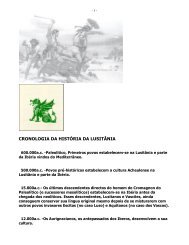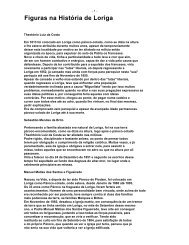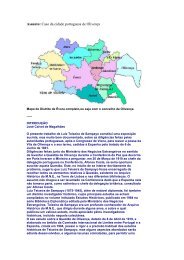Timeline of Portuguese history (Lusitania and Gallaecia)
Timeline of Portuguese history (Lusitania and Gallaecia)
Timeline of Portuguese history (Lusitania and Gallaecia)
You also want an ePaper? Increase the reach of your titles
YUMPU automatically turns print PDFs into web optimized ePapers that Google loves.
• 46 BC<br />
o Julius Caesar proceeds to North Africa where he defeats the remnants <strong>of</strong> Pompey's Senatorial supporters (the Optimates) under Marcus Porcius<br />
Cato Uticencis.<br />
o Julius Caesar is again elected Dictator <strong>and</strong> introduces the Julian Calendar.<br />
o Pompey's sons Gnaeus Pompeius <strong>and</strong> Sextus Pompeius, together with Titus Labienus, Caesar's former propraetorian legate (legatus propraetore)<br />
<strong>and</strong> second in comm<strong>and</strong> in the Gallic War, escaped to Hispania, where they continued to resist Caesar's dominance <strong>of</strong> the Roman world.<br />
o November, Julius Caesar arrives in Hispania with eight legions <strong>and</strong> 8,000 cavalry <strong>of</strong> his own. Caesar's arrival was completely unexpected by the<br />
enemy, <strong>and</strong> the surprise gave him an early advantage.<br />
o Gaius Octavianus <strong>and</strong> Marcus Vipsanius Agrippa join Julius Caesar in Hispania, where the Civil War continues.<br />
• 45 BC<br />
o Battle <strong>of</strong> Munda, in southern Hispania, where, in his last victory, Julius Caesar defeats the Pompeian forces <strong>of</strong> Titus Labienus <strong>and</strong> Gnaeus Pompeius<br />
.<br />
o Sextus Pompeius, departing from his garrison at Corduba (in Baetica), roams Hispania Ulterior fighting against its governor (appointed by Julius<br />
Caesar), before fleeing for Sicily. End <strong>of</strong> the Roman Civil War.<br />
o Julius Caesar, before going back to Rome, leaves his legate governors with the mission <strong>of</strong> pacifying Hispania <strong>and</strong> punish the local tribes for their<br />
disloyalty. Once again resistance grows <strong>and</strong> the Romans will have to deal with small local uprising in the years to come.<br />
o Julius Caesar adopts Gaius Octavianus who becomes Gaius Julius Caesar Octavianus.<br />
o Julius Caesar returns to Rome victorious <strong>and</strong> is Named Pater Patriae <strong>and</strong> Dictator (3rd time) by the Roman Senate.<br />
o Gnaeus Pompeius Magnus is deified by the Roman Senate through the request <strong>of</strong> Julius Caesar.<br />
• 44 BC<br />
o Julius Caesar is appointed Perpetual Dictator (Dictator Perpetuus).<br />
o February, Julius Caesar refuses the diadem <strong>of</strong>fered by Marcus Antonius, thus demonstrating that he did not intend to assume the throne as King <strong>of</strong><br />
Rome.<br />
o Ides <strong>of</strong> March: Julius Caesar, dictator <strong>of</strong> Rome, is assassinated by a group <strong>of</strong> Roman senators. Beginning <strong>of</strong> the end <strong>of</strong> Roman Republic period <strong>and</strong><br />
establishment <strong>of</strong> Roman Empire.<br />
• 42 BC - Julius Caesar is formally deified as "the Divine Julius" (Divus Julius).<br />
• 39 BC-29 BC - Several Roman governor <strong>of</strong> Hispania Ulterior celebrate Roman triumphs in Rome for their victories in submitting the rebellious local<br />
tribes <strong>and</strong> nations.<br />
• 27 BC<br />
o January 16 - Gaius Julius Caesar Octavianus becomes Roman Emperor as Caesar Augustus. Definitive end <strong>of</strong> the Roman Republic <strong>and</strong><br />
establishment <strong>of</strong> the Roman Empire.<br />
o The Roman general <strong>and</strong> politician Marcus Vipsanius Agrippa divides all Hispania into 3 parts, <strong>Lusitania</strong>, Baetica <strong>and</strong> Tarraconensis.<br />
o The emperor Augustus returns to Hispania <strong>and</strong> makes a new administrative division, creating the province <strong>of</strong> Hispania Ulterior <strong>Lusitania</strong>, whose<br />
capital was to be Emerita Augusta (currently Mérida). Originally <strong>Lusitania</strong> included the territories <strong>of</strong> Asturias <strong>and</strong> <strong>Gallaecia</strong>, but these were later<br />
ceded to the jurisdiction <strong>of</strong> Provincia Tarraconensis <strong>and</strong> the former remained as Provincia <strong>Lusitania</strong> et Vettones.<br />
• 28 BC-24 BC<br />
o Augustus' military campaigns pacificate all Hispania under Roman rule.<br />
o Foundation <strong>of</strong> the Roman cities <strong>of</strong> Asturica Augusta (Astorga) <strong>and</strong> Bracara Augusta (Braga), to the north, <strong>and</strong>, to the south, Emerita Augusta (<br />
Mérida) (settled with the emeriti <strong>of</strong> the 5th <strong>and</strong> 10th legions).<br />
• 23 BC - The emperor Augustus establishes the Principate <strong>and</strong> the Pax Romana.<br />
1st century<br />
• 14 - Tiberius becomes Roman Emperor.<br />
• 37 - Caligula becomes Roman Emperor.<br />
• 41 - Claudius becomes Roman Emperor.<br />
• 54 - Nero becomes Roman Emperor.<br />
• 65 - Emperor Nero orders his former tutor <strong>and</strong> advisor Lucius Annaeus Seneca the Younger <strong>and</strong> his nephew Marcus Annaeus Lucanus, both born in<br />
Hispania Baetica, to commit suicide.<br />
• 68 - Galba becomes Roman Emperor.<br />
• 69<br />
o January - Otho <strong>and</strong> Vitellius become Co-Emperors.<br />
o July 1 - Vespasian is proclaimed Roman Emperor against the surviving Co-Emperor Vitellius.<br />
o December 22 - Co-Emperor Vitellius dies. Vespasian becomes sole Emperor.<br />
• 79 - Titus becomes Roman Emperor.<br />
• 81 - Domitian becomes Roman Emperor.<br />
• 96 - Nerva becomes Roman Emperor.<br />
• 98 - Trajan, born in Hispania Baetica, becomes Roman Emperor.<br />
2nd century<br />
• 103 - Probable date <strong>of</strong> death <strong>of</strong> the poet Martial, born in Hispania Tarraconensis.<br />
• 117 - Hadrian, born in Hispania Baetica, becomes Roman Emperor.<br />
• 138 - Antoninus Pius becomes Roman Emperor.<br />
• 161 - Marcus Aurelius <strong>and</strong> Lucius Verus become Co-Emperors.<br />
• 169 - Marcus Aurelius becomes sole Emperor.<br />
• 177 - Commodus becomes Co-Emperor with Marcus Aurelius.<br />
• 180 - Commodus becomes sole Emperor.<br />
• 193<br />
o January 1 - Pertinax becomes Roman Emperor.<br />
o March 28 - Didius Julianus becomes Roman Emperor.<br />
o April 9 - Septimius Severus becomes Roman Emperor.<br />
- 4 -






